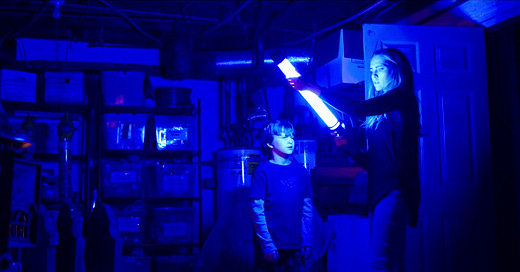Lights Out

"Lights Out" feeds on our primal fears. Yes, it has a spooky ghost and plenty of supernatural scares, but what will truly get under your skin is its focus on the darkness of our everyday lives.
Teresa Palmer stars as Rebecca, a bitter twentysomething who reunites with her mentally ill mother (Maria Bello) and little brother (Gabriel Bateman) when a sinister spirit named Diana (Alicia Vela-Bailey) seeps back into their lives. We learn that Rebecca first encountered Diana when her father left home, and the spirit returns after her stepdad dies, in the midst of her mother's mourning.
"Diana comes around when Mom is at her worst," Rebecca tells her brother. Then, the film emerges as a funhouse reflection of depression. And Diana turns into something deeper than a mere monster. The film paints her as a manifestation of the darkness clouding the mother's mind. Diana only appears when lights are off — in physical places and emotional recesses.
The dramatic heft of the story is impressive considering the film started as a three-minute short. Screenwriter Eric Heisserer takes the simple premise of a creature that comes alive when the lights go out and turns it into subtle yet unsettling portrait of mental illness. Palmer and Bello bring emotional weight as well, portraying feminine forces of calm in the midst of chaos.
"Lights Out" works quite well as a somber drama, but it's also a thrilling haunted hayride of a film. You'll hold your breath and grip your armrest whenever the characters find themselves in the shadows where Diana might be lurking. And she is a haunting sight — a living, breathing abyss. Like Pinhead or Michael Myers, Diana is instantly iconic.
With the exception of a few brief bursts of grisly violence, this isn't a gory horror film. Produced by James Wan, it seems to belong in the same vein as "The Conjuring" or "Insidious," focusing more on filling audiences with an air of dread rather than churning their stomachs with gruesome imagery.
Adapting his 2013 short film and making his big-screen debut, director David F. Sandberg makes an understated yet lasting impression. He takes the less-is-more approach, never lingering too long on Diana and keeping viewers in the dark. (One particularly creepy scene is even lit only by candlelight.) Given the premise, the film may not be as visually inventive as you'd expect, but it certainly keeps your eyes glued to the screen. You'll find yourself eagerly waiting for Diana to pop out of the shadows or creep around the corner of your eye.
This film may not be an instant horror classic, but for 80 breathless minutes, it holds you firmly in its grip. It's a good time at the movies. "Lights Out" is ultimately a horror film in which viewers can have their popcorn and eat it, too. It offers surface-level thrills and chills, but it also digs for something a little deeper and emotionally disturbing. Like "Poltergeist" or "The Exorcist," it keeps its heart intact amid all the horror.


